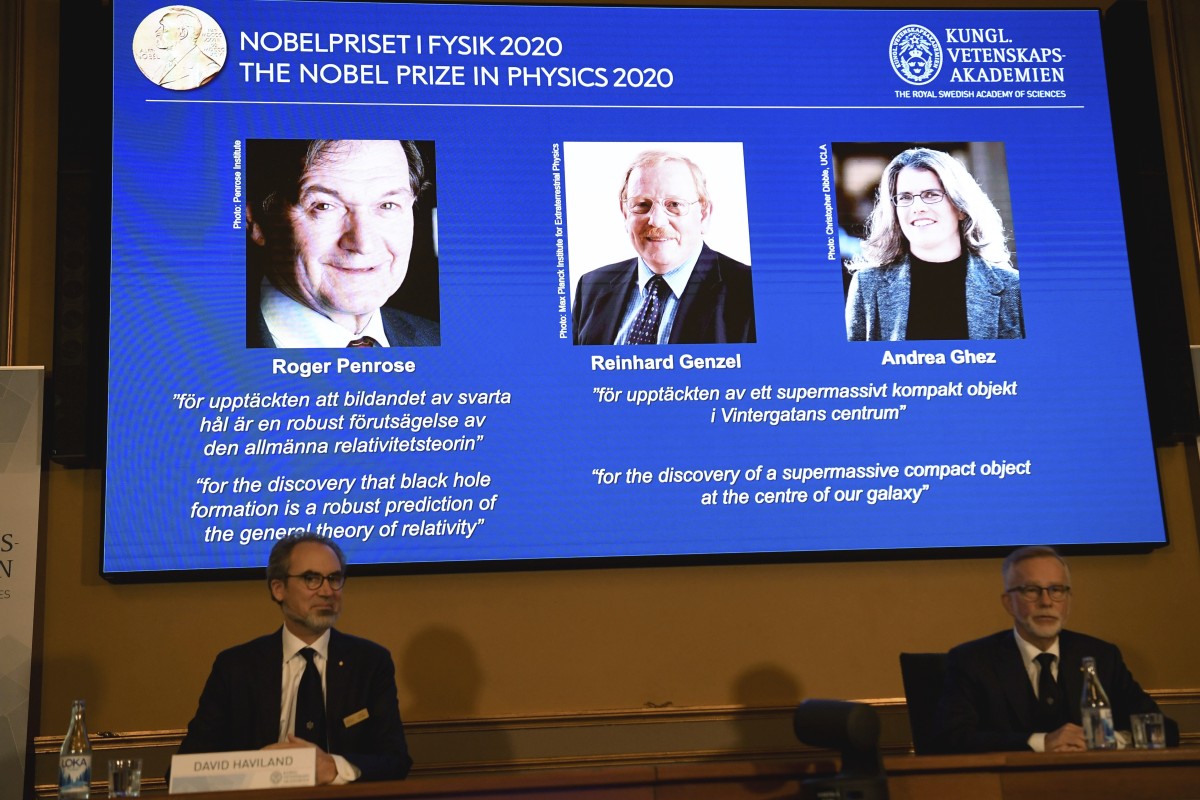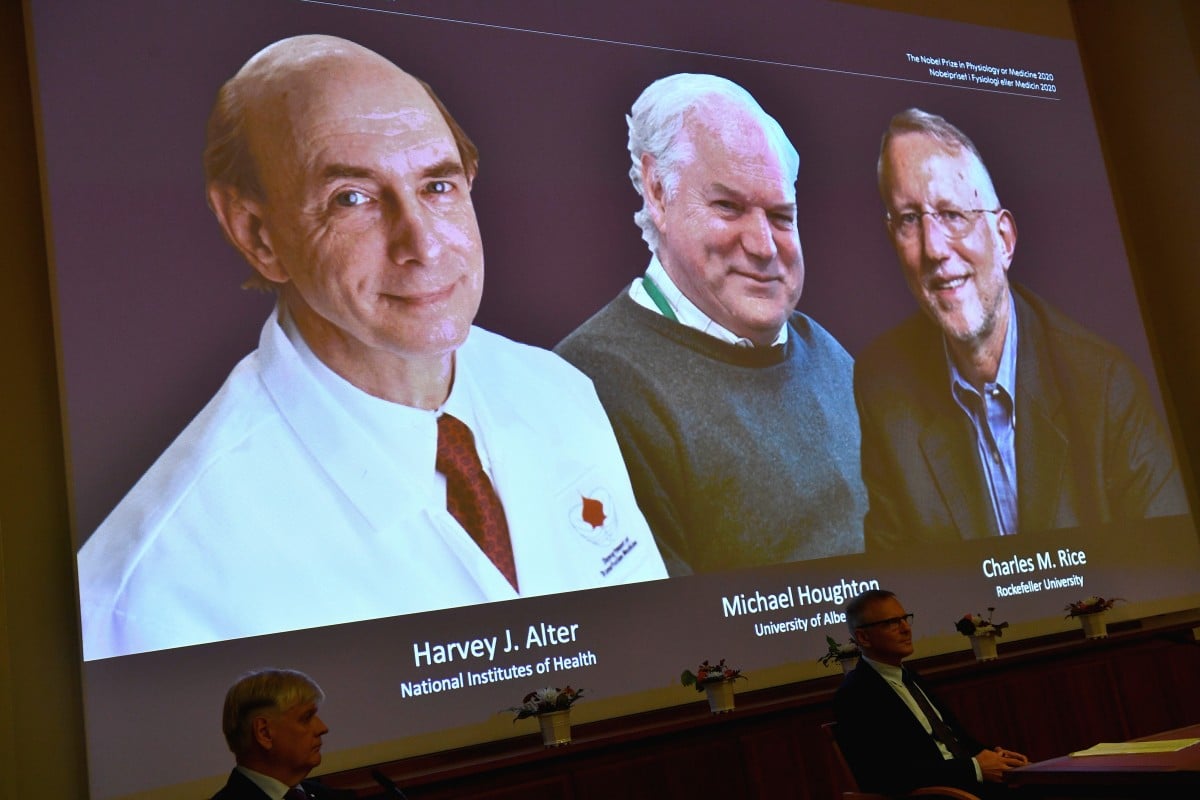www.aljazeerah.info
News, October 2020
Archives
Mission & Name
Conflict Terminology
Editorials
Gaza Holocaust
Gulf War
Isdood
Islam
News
News Photos
Opinion Editorials
US Foreign Policy (Dr. El-Najjar's Articles)
www.aljazeerah.info
|
Editorial Note: The following news reports are summaries from original sources. They may also include corrections of Arabic names and political terminology. Comments are in parentheses. |
Nobel Prize in Physics Awarded to 3 Black Hole Researchers, in Medicine to 3 Researchers Who Discovered Hepatitis C
October 6, 2020
 |
 |
| The winners of the 2020 Nobel Prize in Physics are announced during a news conference at the Royal Swedish Academy of Sciences, in Stockholm, on October 6, 2020 |
Harvey J. Alter, Michael Houghton and Charles M. Rice were awarded the 2020 Nobel Prize in medicine for the discovery of the hepatitis C virus |
Nobel Prize in Physics divided between Roger Penrose, Reinhard Genzel and Andrea Ghez for black hole research
The prize was awarded to the British, German and US scientists for their work on the formation of black holes The Nobel Prize for Medicine was awarded to Americans Harvey Alter, Charles Rice and Briton Michael Houghton for the hepatitis C virus discovery
The winners of the 2020 Nobel Prize in Physics are announced during a news conference at the Royal Swedish Academy of Sciences, in Stockholm, on October 6. Photo: AP Britain’s Roger Penrose, Reinhard Genzel of Germany and US scientist Andrea Ghez won the 2020 Nobel Prize for Physics for their discoveries about one of the most exotic phenomena in the universe, the black hole, the award-giving body said on Tuesday.
Penrose, 89, professor at the University of Oxford, won half the prize for his work using mathematics to prove that black holes are a direct consequence of the general theory of relativity.
Genzel, 68, of the Max Planck Institute and University of California, Berkeley, and Ghez, 55, at the University of California, Los Angeles, shared the other half for discovering that an invisible and extremely heavy object governs the orbits of stars at the centre of our galaxy.
Physics is the second of this year’s crop of Nobels to be awarded, after three scientists won the Nobel Prize in Medicine for their discovery of Hepatitis C on Monday.
Recipients of prizes in the fields of chemistry, literature and peace will be announced later this week. The economics award is due next week.
Among the Nobel Prizes, physics has often dominated the spotlight with past awards going to scientific superstars such as Albert Einstein for fundamental discoveries about the make-up of the universe, including the general theory of relativity.
“The discoveries of this year’s Laureates have broken new ground in the study of compact and supermassive objects,” David Haviland, chair of the Nobel Committee for Physics, said on awarding the 10 million Swedish crown (US$1.1 million) prize. “But these exotic objects still pose many questions that beg for answers and motivate future research.”
Ghez is only the fourth woman to win the physics prize, after Marie Curie in 1903, Maria Goeppert Mayer in 1963 and Donna Strickland in 2018.
Last year, James Peebles, a dual citizen of Canada and the US, and Swiss duo Michel Mayor and Didier Queloz were awarded for contributions to the understanding of the evolution of the universe and Earth’s place in the cosmos.
The Nobel Prizes were created in the will of Swedish dynamite inventor and businessman Alfred Nobel and have been awarded since 1901.
The actual awards – comprising a medal and a diploma – were set to be presented on December 10, the anniversary of Nobel’s death.
Organisers earlier said that, due to the coronavirus pandemic, the laureates in science, literature and peace would likely to receive their awards in their respective home countries instead of being asked to travel to Stockholm for the award ceremony.
The Peace Prize ceremony in the Norwegian capital of Oslo has been moved to a smaller venue with fewer guests. This year’s peace laureate or laureates will either be presented in person or asked to participate in an online event.
Nobel Prize in medicine awarded to Harvey Alter, Michael Houghton and Charles Rice for hepatitis C discovery
The three were honoured for their ‘decisive contribution to the fight against blood-borne hepatitis’, the jury said The prestigious award comes with a gold medal and prize money of about US$1.1 million.
Americans Harvey Alter and Charles Rice together with Briton Michael Houghton won the Nobel Medicine Prize on Monday for the discovery of the hepatitis C virus, the Nobel jury said.
The three were honoured for their “decisive contribution to the fight against blood-borne hepatitis, a major global health problem that causes cirrhosis and liver cancer in people around the world,” the jury said.
The World Health Organization estimates there to be around 70 million hepatitis C infections globally, causing around 400,000 deaths each year.
Thanks to their discovery, highly sensitive blood tests for the virus are now available and these have “essentially eliminated post-transfusion hepatitis in many parts of the world, greatly improving global health”, the Nobel committee said.
Their discovery also allowed the rapid development of antiviral drugs directed at hepatitis C.
“For the first time in history, the disease can now be cured, raising hopes of eradicating hepatitis C virus from the world population,” the jury said.
Alter, 85, told Swedish Radio he was stunned to receive an early-morning call from the committee, saying it was “mind- boggling”.
“I didn’t even realise this was the day the Nobel Prizes were going to be given out,” he added.
“To see so many people get cured is astounding,” he told the Nobel Foundation.
The three scientists will share the Nobel Prize sum of about US$1.1 million. Photo: AFP
Before the trio’s work, the discovery of the hepatitis A and B viruses had seen critical steps forward, but most blood-borne hepatitis cases remained unexplained.
“The discovery of hepatitis C virus revealed the cause of the remaining cases of chronic hepatitis and made possible blood tests and new medicines that have saved millions of lives,” the jury said.
Alter was credited for his pioneering work studying the occurrence of hepatitis in patients who had received blood transfusions, determining that their illness was neither hepatitis A or B.
Houghton built on Alter’s work to isolate the genetic sequence of the new virus.
Rice subsequently completed the puzzle by using genetic engineering to prove that it was the new strain alone – hepatitis C – that was causing patients to get sick.
The trio will share the Nobel Prize sum of 10 million Swedish kronor (about US$1.1 million).
They would normally receive their prize from King Carl XVI Gustaf at a formal ceremony in Stockholm on December 10, the anniversary of the 1896 death of scientist Alfred Nobel who created the prizes in his last will and testament.
But the in-person ceremony has been cancelled this year due to the coronavirus pandemic , replaced with a televised ceremony showing the laureates receiving their awards in their home countries.
The award for work on a virus comes as the world battles the new Covid-19 pandemic, which has put the global spotlight on science and research.
“The pandemic is a big crisis for mankind, but it illustrates how important science is,” Nobel Foundation head Lars Heikensten said.
However, no prizes were expected to be awarded this year for work directly linked to the new coronavirus, as Nobel Prize-winning research usually takes many years to be verified.
The prize-awarding committees are “not in any way influenced by what is happening in the world at the time,” Erling Norrby, the former permanent secretary of the Swedish Royal Academy of Sciences which awards the science prizes, said.
“It takes time before a prize can mature, I would say at least 10 years before you can fully understand the impact” of a discovery, Norrby, himself a virologist, said.
The work of the various prize committees is shrouded in secrecy and the names of the nominees are not disclosed for 50 years, leading to rampant speculation.
The winners of this year’s physics prize will be revealed on Tuesday, with astrophysicists Shep Doeleman of the US and Germany’s Heino Falcke seen as possible winners for work that led to the first directly observed image of a black hole in April 2019.
American mathematician Peter Shor who paved the way for today’s research on quantum computers, or France’s Alain Aspect for his work on quantum entanglement, have also been mentioned in Swedish media.
The chemistry prize announcement will follow on Wednesday, followed by the literature prize on Thursday.
Meanwhile, speculation ahead of Friday’s peace prize has focused on press freedom groups, Swedish teenager Greta Thunberg and other climate activists, or several UN organisations.
The economics prize will wrap up the Nobel Prize season on Monday, October 12.
***
Share the link of this article with your facebook friendsFair Use Notice
This site contains copyrighted material the
use of which has not always been specifically authorized by the copyright
owner. We are making such material available in our efforts to advance
understanding of environmental, political, human rights, economic,
democracy, scientific, and social justice issues, etc. We believe this
constitutes a 'fair use' of any such copyrighted material as provided for
in section 107 of the US Copyright Law. In accordance with Title 17 U.S.C.
Section 107, the material on this site is
distributed without profit to those
who have expressed a prior interest in receiving the included information
for research and educational purposes. For more information go to: http://www.law.cornell.edu/uscode/17/107.shtml.
If you wish to use copyrighted material from this site for purposes of
your own that go beyond 'fair use', you must obtain permission from the
copyright owner.
|
|
|
|
||
|
||||||


